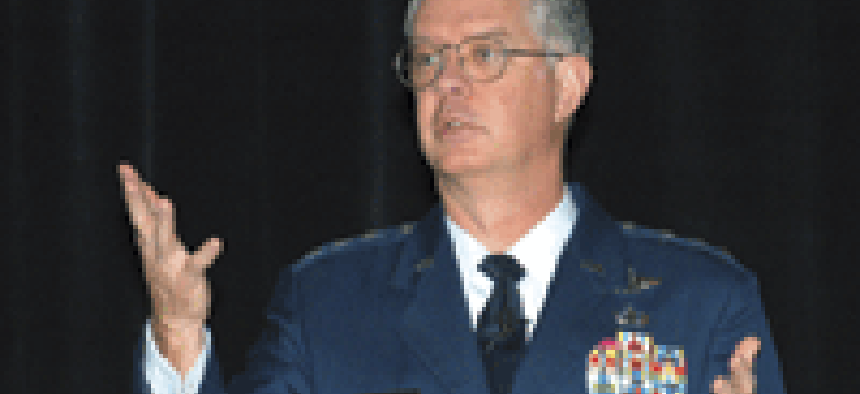Doing Business With Defense Security Cooperation Agency

Defense Security Cooperation Agency<br>2800 Defense Pentagon<br>Washington, DC 20301-2800<br>703-601-3670
Defense Security Cooperation Agency2800 Defense PentagonWashington, DC 20301-2800703-601-3670 1971 Air Force Lt. Gen. Jeffrey Kohler Richard Millies 133. Total number of employees is unavailable. The Defense Security Cooperation Agency performs the Defense Department's security role in military assistance, international military training and foreign military sales to countries friendly to the United States.The foreign military sales program works on a "no-profit, no-loss basis" by charging countries an administrative fee. Programs under military assistance () include Foreign Military Sales, Foreign Military Financing and International Training. The agency also manages other Defense Department programs, such as humanitarian efforts and strategic planning. $401.7 billion $86.3 millionDSCA is funded by a percentage of what the agency collects on sales and is not fully funded through the federal budget.XXXSPLITXXX- Chief information officer October 1998. He is the agency's first CIO. Has lived most of his life in metropolitan Washington. Potomac, Md. House, garden and automotive chores on the weekends. Lap swimming in the summertime. "Physical activity and readily completed tasks are a good antidote for my office life." "I'm embarrassed to admit that I haven't read a book in years. I spend my evenings working through my office inbox, and I read key sections of the newspaper thoroughly on a daily basis. On vacations, I catch up on IT trade publications." Bachelor's in engineering science from the Johns Hopkins University, master's and doctorate degrees in applied mechanics from Stanford University. "Most of my career has focused on the cost and effectiveness of information systems, both for business systems and military command and control systems."Scher: The name of the Defense Security Cooperation Agency often fools people into thinking that we deal primarily with personnel security. Actually, DSCA is part of the undersecretary of defense for policy, and primarily provides guidance for the execution of U.S. security cooperation programs approved by the State Department. We also implement several Defense Department international programs. Consequently, the technical challenge is to build effective information systems to support the unique mission of our business. The biggest IT challenge is defining information system developments that measurably enhance the business and reduce costs. We started with aging, duplicative legacy systems; an IT investment budget that is small compared to the cost of a legacy replacement; and absence of sufficiently detailed business performance and productivity metrics. Like a commercial business, DSCA must cover all business and investment costs, to include major IT investments from its own revenue.Scher: "Military assistance" is an outdated term; we engage in security cooperation and provide security assistance. Our technology needs are those of a multinational business. Our needs boil down to unique business software development with an emphasis on retaining in-house analytic skills to translate pertinent business requirements and rules into software specifications, and to perform modest amounts of enhancements and testing of our systems. Over the past decade, we have been building gradually a single, large replacement system for some legacy functions.Scher: In the last 10 years, we began to use the Internet more to deliver information to our customers and to our overseas management personnel. Recently, we created a Web-based application to facilitate more effective end-use monitoring of defense articles provided to foreign countries and eligible international organizations. Scher: Like most other federal agencies, we are cost sensitive. So vendors should plan on how to deliver their skills and services at attractive prices. The DSCA contracting office is the first point of contact for any vendor.Scher: I expect DSCA to be concluding its ongoing development and continuing maintenance activities with relatively little change, while still focusing on modernizing automation. Several years from now, I anticipate having our IT team working on automating business process changes that provide measurably better, faster and less-expensive service to the security cooperation community.

www.dsca.mil
Founded:
Director:
Deputy director:
Civilian employees:
What it does:
www.dsca.mil/military_assistance_p2.htm
Number crunching:
Defense Department 2005:
DSCA operation and maintenance 2005:
Full title:
Took the job:
Hometown:
Home now:
Hobbies:
What is the last book you read, or what are you reading now?
Alma mater:
WT: What is the role of technology in DSCA's mission? It seems to me you would be dealing with highly secure communications and computing.
WT: Given what DSCA does, are your technology needs different or unique from the typical tech needs of an agency? What part do you play in "military assistance?"
WT: How has technology changed what your agency does or how it does it?
WT: What do you look for in vendors with which you are thinking of doing business?
WT: A year from now, where do you see the agency's technology capabilities?

Air Force Lt. Gen. Jeffrey Kohler
Courtesy of DSCA
www.dsca.mil
Founded:
Director:
Deputy director:
Civilian employees:
What it does:
www.dsca.mil/military_assistance_p2.htm
Number crunching:
Defense Department 2005:
DSCA operation and maintenance 2005:
Full title:
Took the job:
Hometown:
Home now:
Hobbies:
What is the last book you read, or what are you reading now?
Alma mater:
WT: What is the role of technology in DSCA's mission? It seems to me you would be dealing with highly secure communications and computing.
WT: Given what DSCA does, are your technology needs different or unique from the typical tech needs of an agency? What part do you play in "military assistance?"
WT: How has technology changed what your agency does or how it does it?
WT: What do you look for in vendors with which you are thinking of doing business?
WT: A year from now, where do you see the agency's technology capabilities?
NEXT STORY: More power to you